Homemade Ultrasonic Cleaner Solution for Glasses: What Liquid to Use?
2026-02-03
Keeping your eyeglasses clean and free of smudges can be challenging, especially if you wear them every day. Fortunately, an ultrasonic cleaner can help you achieve a spotless, scratch-free finish with minimal effort.
Keeping your eyeglasses clean and free of smudges can be challenging, especially if you wear them every day. Fortunately, an ultrasonic cleaner can help you achieve a spotless, scratch-free finish with minimal effort. But what kind of liquid should you use to clean your glasses in an ultrasonic cleaner? In this article, we’ll guide you through the process of selecting and creating an effective homemade ultrasonic cleaner solution.
How to ultrasonic cleaners work?
-Steps to clean eyeglasses with an ultrasonic cleaner
-Benefits of using an ultrasonic eyeglass cleaning machine
What liquid to use in ultrasonic cleaner for glasses?
-Ultrasonic cleaning solution for glasses: a selection guide
-What is the best homemade solution to clean eyeglasses?
How to make DIY Eye Glass Cleaner?
-Ingredients needed for homemade eyeglass cleaner
-Benefits of Homemade Eyeglass Cleaners
Is it necessary to use vinegar in eyeglass cleaning solution?
-Is vinegar good for cleaning eyeglasses?
-What are the pros and cons of using vinegar in eyeglass cleaning solution?
GTSONIC ultrasonic cleaning device: Different types of ultrasonic cleaning machines
-Portable Mini 46kHz Digital Ultrasonic Glasses Cleaner
-4 Recycle Digital Timer Small Ultrasonic Cleaner For Glasses
-Wireless Ultrasonic Glasses Cleaner
How to ultrasonic cleaners work?
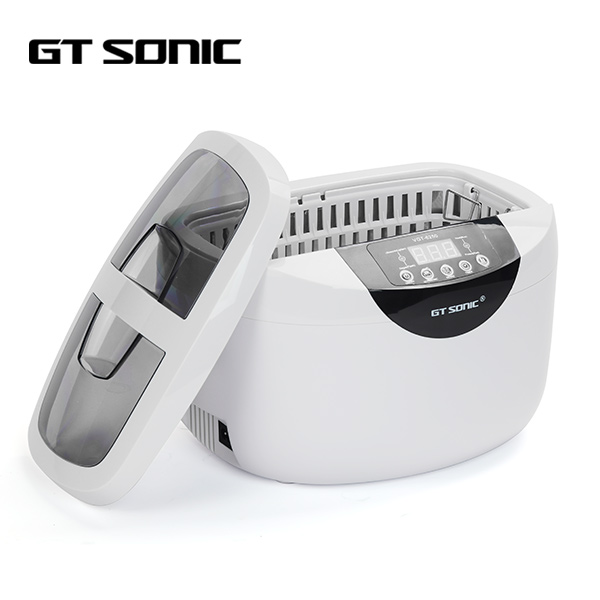
Ultrasonic cleaners use high-frequency sound waves to agitate a cleaning solution, creating microscopic bubbles that gently remove dirt, oil, and other contaminants from surfaces. When placed in the solution, your eyeglasses are subjected to this gentle yet powerful process. The sound waves produce rapid vibrations that break apart dirt particles and grime, cleaning the delicate surface without damaging it.
Steps to Clean Eyeglasses with an Ultrasonic Cleaner
1.Fill the Ultrasonic Cleaner: Add your chosen cleaning solution to the ultrasonic cleaner’s tank. Make sure the solution fully submerges your eyeglasses.
2.Set the Timer: Many ultrasonic cleaners come with a timer that allows you to set the cleaning duration. Typically, glasses should be cleaned for 3-5 minutes, depending on the level of dirt.
3.Start the Machine: Press the start button to begin the cleaning process. You’ll see tiny bubbles form around your glasses, which is the ultrasonic action in progress.
4.Rinse and Dry: Once the cleaning cycle is complete, rinse your eyeglasses with clean water to remove any remaining cleaning solution. Dry them gently with a soft cloth.
Benefits of Using an Ultrasonic Eyeglass Cleaning Machine
Efficient Cleaning: Ultrasonic cleaners can remove dirt, oil, and even dust that traditional cleaning methods might miss.
Gentle on Eyeglasses: Unlike abrasive cloths or harsh chemicals, ultrasonic cleaning is safe for lenses and frames.
Time-Saving: Ultrasonic cleaners offer a fast and effective solution to cleaning your glasses with minimal effort.
Improved Vision: Clean glasses provide better clarity, which enhances your vision.
What Liquid to Use in Ultrasonic Cleaner for Glasses?
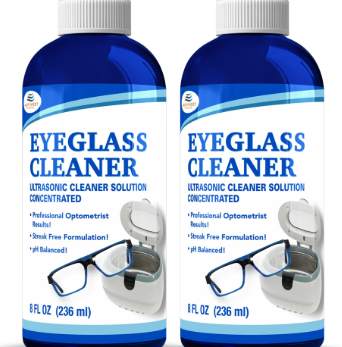
The cleaning solution used in an ultrasonic cleaner is crucial to achieving the best results. Using the right liquid ensures your glasses are cleaned effectively without damage. There are several options to consider, ranging from commercial cleaning solutions to homemade alternatives.
Ultrasonic Cleaning Solution for Glasses: A Selection Guide
There are different types of liquids you can use in an ultrasonic cleaner for eyeglasses:
Commercial Ultrasonic Cleaning Solutions: These are specifically formulated for cleaning eyeglasses and optical lenses. They contain ingredients that clean without leaving residue or damaging coatings like anti-reflective layers.
Water with Dish Soap: A mild solution of water and a small amount of dishwashing detergent can work well for light cleaning tasks. Dish soap helps break down oils and grease on the lens.
Isopropyl Alcohol and Water: For tougher smudges or stubborn fingerprints, a mixture of isopropyl alcohol and water can be effective. Alcohol evaporates quickly and helps to clean without leaving residue.
What is the Best Homemade Solution to Clean Eyeglasses?
If you're looking for a homemade ultrasonic cleaner solution for your eyeglasses, here are some easy-to-make options:
Water and Dish Soap: A simple and effective solution for regular maintenance. Mix a few drops of mild dish soap with warm water.
Isopropyl Alcohol and Water: A 50/50 mixture of isopropyl alcohol and water works well for removing stubborn dirt or oily residues. Be sure to dilute the alcohol, as it can be too strong on its own.
Baking Soda and Water: For a more natural solution, mix a teaspoon of baking soda with warm water. This helps to gently scrub and remove grime.
White Vinegar and Water: A mixture of equal parts vinegar and water can be used to clean glasses, but it’s best for light cleaning. Vinegar is mildly acidic, which can break down mineral deposits and stains.
How to Make DIY Eyeglass Cleaner?
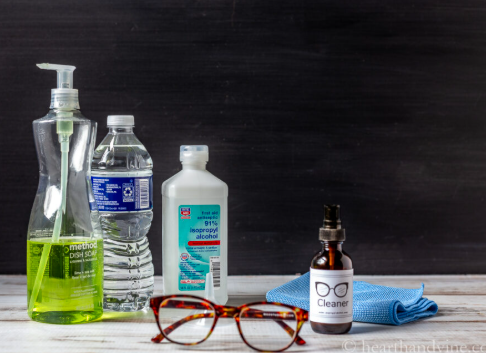
If you're looking to make your own eyeglass cleaner at home, it's quick and easy! Here’s a simple recipe:
Ingredients Needed for Homemade Eyeglass Cleaner:
1 cup distilled water
1 tablespoon isopropyl alcohol (70% or higher)
1 drop mild dish soap (optional)
Instructions:
Mix the water and isopropyl alcohol in a small container.
Add the dish soap if you want a bit of extra cleaning power.
Stir the solution gently.
Pour the mixture into a spray bottle for easy use.
This DIY cleaner is perfect for ultrasonic cleaning and can also be used to clean your glasses with a soft cloth when you don't have your ultrasonic machine handy.
Benefits of Homemade Eyeglass Cleaners
1.Cost-Effective: Making your own cleaning solution is inexpensive and can be made from common household ingredients.
2.Customizable: You can adjust the ingredients based on your needs, adding more alcohol for grease removal or baking soda for tougher stains.
3.Chemical-Free: Homemade cleaners are often free of harsh chemicals and preservatives, making them safer for sensitive skin or coatings on your glasses.
Is It Necessary to Use Vinegar in Eyeglass Cleaning Solution?
While vinegar is a common household cleaning agent, you may wonder if it’s suitable for cleaning eyeglasses in an ultrasonic cleaner.
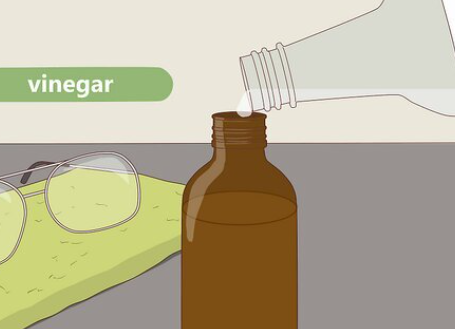
Is Vinegar Good for Cleaning Eyeglasses?
Vinegar can be effective for cleaning eyeglasses, especially if you're dealing with mineral deposits or water spots. Its acidity helps break down grime, but it should be used with caution. Always dilute vinegar with water to prevent any potential damage to coatings on the lenses.
What Are the Pros and Cons of Using Vinegar in Eyeglass Cleaning Solution?
1.Pros:
Natural and Non-Toxic: Vinegar is a natural cleaning agent and is safe for the environment.
Effective on Stains: The acidity helps remove mineral deposits and stubborn stains.
2.Cons:
Harsh on Coatings: If your glasses have special coatings like anti-reflective or anti-scratch layers, vinegar can cause damage over time.
Strong Odor: Vinegar has a strong smell that may linger on your glasses.
For best results, it’s recommended to use vinegar sparingly and always dilute it with water.
GTSONIC Ultrasonic Cleaning Device: Different Types of Ultrasonic Cleaning Machines
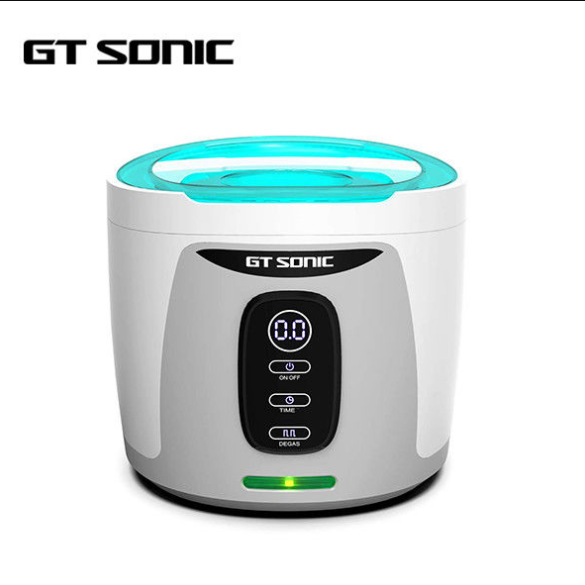
If you’re considering an ultrasonic cleaner for your eyeglasses, GTSONIC offers a variety of options to suit your needs:
Portable Mini 46kHz Digital Ultrasonic Glasses Cleaner
Perfect for individuals who need a portable solution for on-the-go cleaning, this model provides efficient and quick cleaning at 46kHz frequency.
4 Recycle Digital Timer Small Ultrasonic Cleaner For Glasses
This model features a digital timer for precise control, ensuring your glasses are cleaned thoroughly without overexposure. With compact sizing for countertops or travel, it’s a practical choice for everyday eyeglass maintenance; for best results, use a gentle, lens-safe solution and run short cycles (e.g., 3–5 minutes), then rinse and dry with a microfiber cloth.
Wireless Ultrasonic Glasses Cleaner
A convenient wireless option, this ultrasonic cleaner is perfect for those who want to clean their glasses anywhere without the hassle of cords.
Conclusion
Using an ultrasonic cleaner to maintain your eyeglasses can save you time and effort while keeping them in top condition. Whether you choose a commercial solution or make your own homemade ultrasonic cleaner solution, the key is to pick the right liquid for your cleaning needs. For best results, avoid harsh chemicals and always follow the manufacturer’s guidance for both your frames and lenses, especially if they have coatings such as anti-reflective or blue-light filters. With the proper care, your glasses will remain spotless, clear, and in perfect shape for everyday use.
Recommended reading :
1.Best Ultrasonic Eyeglass Cleaners (2025) for Fast and Safe Lens Care
2.The Ultimate Guide to the Best Ultrasonic Retainer Cleaner (2025)
3.Top 5 Best Ultrasonic Cleaners for Dental Instruments: Effective Cleaning Solutions










